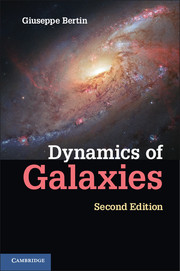Book contents
- Frontmatter
- Contents
- Preface to the Second Edition
- Preface to the First Edition, 2000
- Acknowledgments
- PART I Basic Phenomenology
- PART II Physical Models
- PART III Spiral Galaxies
- 13 Orbits
- 14 The Basic State: Vertical and Horizontal Equilibrium of the Disk
- 15 Density Waves
- 16 Roles of Gas
- 17 Global Spiral Modes
- 18 Spiral Structure in Galaxies
- 19 Bending Waves
- 20 Dark Matter in Spiral Galaxies
- PART IV Elliptical Galaxies
- PART V In Perspective
- Bibliography
- Index of objects
- Index
17 - Global Spiral Modes
from PART III - Spiral Galaxies
Published online by Cambridge University Press: 05 June 2014
- Frontmatter
- Contents
- Preface to the Second Edition
- Preface to the First Edition, 2000
- Acknowledgments
- PART I Basic Phenomenology
- PART II Physical Models
- PART III Spiral Galaxies
- 13 Orbits
- 14 The Basic State: Vertical and Horizontal Equilibrium of the Disk
- 15 Density Waves
- 16 Roles of Gas
- 17 Global Spiral Modes
- 18 Spiral Structure in Galaxies
- 19 Bending Waves
- 20 Dark Matter in Spiral Galaxies
- PART IV Elliptical Galaxies
- PART V In Perspective
- Bibliography
- Index of objects
- Index
Summary
The discussion of density waves given in Chapter 15 is only one important step in the study of the dynamics of even perturbations on an axisymmetric self-gravitating disk. As already emphasized at the end of that chapter, we should complete the analysis by taking into account the inhomogeneity of the disk and the relevant physical conditions at the boundaries. However, the focus on the study of waves is given priority because of its simplicity and its usefulness in identifying the relevant dynamical mechanisms (see Section 15.5) and, historically, because of its immediate application in testing the density-wave theory against observations of spiral structures in galaxies within a semiempirical approach.
Given the symmetry of the basic state and the radial inhomogeneity of the disk, we consider disturbances for which the perturbed density of the disk is given by σ1(r)exp[i(ωt−mθ)] and, for given values of ω and m, look for appropriate functions σ1(r) that satisfy the dynamical equations and the relevant physical conditions at the boundaries. In general, this is an eigenvalue problem, and the associated spectrum is not continuous in the sense that the problem admits solutions for only selected values of the frequency. These solutions are often called global modes or simply modes. For a given model, once we have formulated the (linearized) mathematical problem, we can use numerical integration for the calculation of such modes with no need for the approximate description in terms of waves contained in a local dispersion relation [see Eq. (15.1)].
Information
- Type
- Chapter
- Information
- Dynamics of Galaxies , pp. 229 - 246Publisher: Cambridge University PressPrint publication year: 2014
